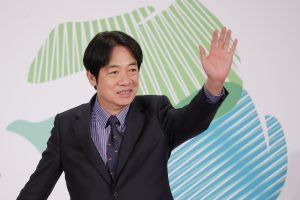After a historical setback in the recent local elections, President Tsai Ing-wen stepped down as the chair of the Democratic Progressive Party (DPP), the current ruling party of Taiwan. As a result, Vice President William Lai will be taking the position within a month, which also means that he is positioned to be the party’s next presidential candidate. This has caused anxiety for observers of East Asian politics due to the fact that Lai was once regarded as a pro-independence figure in Taiwanese political circles. This misunderstanding needs to be clarified for the good of peace and stability in the Asia-Pacific.
First and foremost, the vice president has declared repeatedly that he will not be pursuing de jure Taiwanese independence, and he will not initiate any referendum to that end. On a diplomatic trip to Palau in November, he vowed his commitment to Tsai’s cross-strait stance, which includes “upholding the status quo in the Taiwan Strait” and “promoting cross-strait people-to-people exchanges.” Lai has also told the press that he will definitely continue to follow Tsai’s path on cross-strait relations as it took Tsai six years to build consensus within Taiwan, if not with the whole democratic world.
Based on the speeches he has given, the new DPP chair’s cross-strait policy will be closely aligned with Tsai’s. Thus the status quo of the cross-strait relations will not be changed unilaterally by the DPP and the Taiwanese government.
Moving beyond cross-strait relations, it is worth mentioning that Lai has a solid friendship with Japanese political figures. After Abe Shinzo was assassinated, the vice president went to Japan on a low-profile trip to send his condolences to the former premier of Japan, with both Tokyo and Taipei saying that Lai’s visit was made for personal reasons. It can be said that the friendship between Lai and Abe’s family is profound enough to make the Japanese government invite the vice president of Taiwan to Japan, the highest level of exchange in the last 37 years.
This close relationship between Lai and Japan started more than 10 years ago. When the 2011 Tohoku Earthquake took nearly 20,000 lives in Japan, Lai, then the mayor of Tainan, initiated an aid program, called for donations to Japan, and visited Japan with his senior officials to send condolences and receive opinions on what the Taiwanese can do for the Japanese. After that year, the relationship between Lai and the Japanese government became solid, and during his term, a number of Japanese figures visited Tainan to explore more comprehensive cooperation plans between cities. Thus, we can expect deeper cooperation and friendship between the DPP and the Japanese ruling party, the Liberal Democratic Party (LDP) during Lai’s term as the chairperson of the DPP.
On the day that Lai declared he would take the position as DPP chair, the Chinese government, despite having their hands full with protests across the nation, conveyed their anger by sending 27 Chinese warplanes and four warships near Taiwan, including nine jets that crossed the median line of the Taiwan Strait.
It is generally believed that the Chinese Communist Party will be more aggressive on the Taiwan issue during Xi’s unprecedented third term as the supreme leader, since Xi has put his men in almost every significant position. Therefore, the situation in cross-strait relations will be riskier than in the last 10 years, when there were politicians from other factions to hold Xi back from making destructive policies. Now that Lai is taking the DPP chair position, the risks for regional security will be even greater, based on the fact that the Chinese government still views William Lai as a radically pro-independence figure.
That said, it can be expected that during Lai’s time as DPP chair in Taiwan, the dynamics in the Asia-Pacific region would not see a radical change. Yet, a marginal shift in the strategic triangle in East Asia could be seen, in which Japan would be closer to Taiwan because of more frequent exchanges between the ruling parties from both countries, while the differences between Taiwan and China could increase. In other words, the current situation pitting democratic alliances versus authoritarian regimes in East Asia will be strengthened.
Given all this, the best way for the democratic world to keep the region safe is not to be worried about the new chairperson of the DPP, but to keep cooperating with shared-value allies to deter China from invading Taiwan.

































